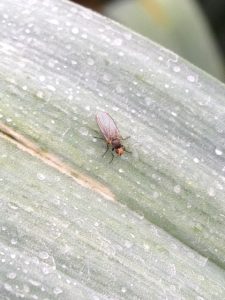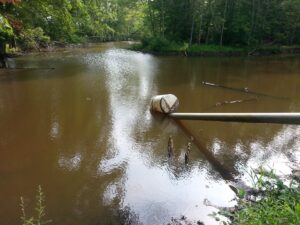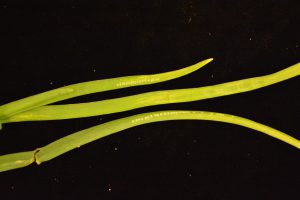Vegetable Crops Edition
Seasonal updates and alerts on insects, diseases, and weeds impacting vegetable crops. New Jersey Commercial Vegetable Production Recommendations updates between annual publication issues are included.
Subscriptions are available via EMAIL and RSS.
Quick Links:
 NJ Commercial Vegetable Production Recommendations
NJ Commercial Vegetable Production Recommendations
 Rutgers Weather Forecasting - Meteorological Information important to commercial agriculture.
Rutgers Weather Forecasting - Meteorological Information important to commercial agriculture.
Pesticide Applicator or Dealer Storage Inventory with Cover Letter Due May 1st to Fire Department
Allium leaf miner update: 04/06/21
Allium Leaf Miner
Allium leaf miner (ALM) feeding/egg laying scars were detected in a large chive planting near Milford, Hunterdon County on Tuesday of this week. Feeding was very low (<0.5% of chive clusters), but several adults were observed in the planting. This indicates that the first (spring) flight of these flies has now begun and damage will increase. No injury or adults were found in a similar inspection of a commercial chive planting near Lawrenceville (Mercer Co.) on the same day. Yellow sticky cards were deployed in both locations and will be checked weekly. We look to identify the peak of the flight in central and northern NJ, as well as the period when the adult population is in decline. Growers in southern counties should assume there is egg laying activity in their area currently.
The Milford and Princeton NJ weather stations that are closest to these farms both surpassed 250 growing degree days (GDD) base 39˚F on Monday (4/5). This GDD base is close to that (38.3˚ F) which our colleagues at Penn State recommend for predicting the first emergence of ALM adults.
Growers should consider initiating the control method of their choice at this time. Affected crops include chives, scallions, garlic, onions and leeks. Look for neat rows of white spots descending from the upper tips of allium leaves (see photo at left). Initial injury often occurs on the tallest leaves. Under warmer, less breezy conditions, adults may be seen near the tips of leaves (see photo of adult at lower right).
Floating row covers, kept on until this flight ends will help minimize access to plants. Insecticide applications targeting adults may be helpful as well, although frequency of applications is uncertain. Spinosyn materials (Radiant, Entrust (OMRI approved)), pyrethroids (Mustang Maxx,  Warrior), neonicotinoids (Scorpion, Venom) and the insect growth regulator Trigard are labeled for miner control.
Warrior), neonicotinoids (Scorpion, Venom) and the insect growth regulator Trigard are labeled for miner control.
Adult activity and observations of feeding will be reported on in the IPM Update as they occur. At this time, all growers should respond to the first adult generation. We will attempt to identify the end of the first flight so that growers know when the risk of infestation has abated.
This Week’s Changes and Updates to Relief Programs that Impact Farmers
This past week brought several changes and updates to relief programs that impact farmers. This blog from the University of Minnesota is a good summary of changes and announcements by USDA on relief programs that impact farmers and includes links to websites with more information: https://blog-abm-news.extension.umn.edu/2021/03/paycheck-protection-program-extended.html.
The American Rescue Plan Act uses the 2501 definition of “socially disadvantaged”, which includes Black/African American, American Indian or Alaskan native, Hispanic or Latino, and Asian American or Pacific Islander. Gender is not a criteria in and of itself, but of course women are included in these categories.
For the latest CFAP details, visit farmers.gov/cfap.
To find your local service center and learn more about how to access their services during the pandemic, visit farmers.gov/service-center-locator.
On Farm Readiness Reviews (OFRR) Available to Produce Growers
As part of the Food Safety Modernization Act (FSMA) the New Jersey Department of Agriculture in coordination with Rutgers Cooperative Extension are again offering an OFRR to any operation that has taken the Produce Safety Alliance (PSA) Training. The PSA training is required for fresh produce operations to comply with FSMA with sales over $25,000. We have been doing OFRRs over the last two years (approximately 100) and want to continue this service during 2021. So, what is the OFRR? It is a walkthrough of the farm operation to assess where it may need for make changes to comply with FSMA prior to an inspection. Generally, two individuals will be on the assessment team one from Extension and one from the New Jersey Department of Agriculture. These reviews take approximately 2 hours and is scheduled to fit into the grower’s time. To schedule a review email Charlotte Muetter at charlotte.muetter@ag.nj.gov. She will then contact the farm operation to schedule the review.
On-Farm Food Safety Talks for the Busy Grower
The Rutgers On-Farm Food Safety Team has developed three video presentations. Clip on Three On The Go Webinars For the Busy Grower to view the three videos listed below.
Introduction to Food Safety Modernization Act (FSMA) and USDA Audits. Find out the differences between FSMA inspections and USDA audits. Who do they apply to and who does the inspection or audits?
Building Your One-Way Street: Backflow Prevention and Your Farm. Learn what backflow is, how to evaluate your operations and how to prevent problems with backflow to protect your packed produce.
How to Use Best Practices for On-Farm Recordkeeping. Tried and true strategies for organized record keeping that complies with FSMA and will prepare you for USDA audits.
What water test do you need and how often do you need to do it?
FSMA Produce Safety Rule compliance, third party audit standards, and general best practices all include the need for irrigation, harvest, cleaning, sanitation, handwashing, pesticide application, drinking and postharvest water testing. Not all tests are the same, but all cost money, so make sure what your paying for meets your needs.

Here are the questions we commonly get from produce growers and answers that we hope you find helpful:
What water test do I need for a water source that is used only for irrigation of crops and/or pesticide applications?
– This water should be tested for generic E. coli, acceptable results give you a number answer of 126 CFU (colony forming units) or MPN (most probable number) or less. You do not want a presence/absence (P/A) test. A P/A test would not be sufficient for a third-party audit requirement or the FSMA PSR.
-Most water testing labs on the NJ Water Testing Lab Map (link below) offer the EPA 1603 analysis, which satisfies both the FSMA PSR anticipated requirements and third-party audit requirements.
-Other acceptable analysis methods are described on the
Produce Safety Alliance Water Analysis Method Requirement fact sheet.
-Well water sources used for irrigation should be tested once a year.
-Surface water sources should be tested at least three times during their period of use, ideally when starting irrigation, mid-season, and close to harvest. Surface water sources include irrigation ponds (spring fed, well fed, or other ponds), streams, rivers, and other bodies of water that are exposed to the surface.
-Municipal water sources used for irrigation should have a copy of the water testing record on file. These testing records are often found online or are available upon request. Made sure that generic E. coli is listed on the report.
What water test do I need for a water source that is used during the harvest process? Handwashing water? Cleaning and sanitizing use? Postharvest washing and cooling water?
[Read more…]

